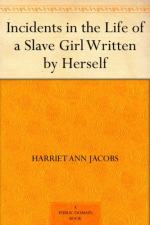At that moment I saw a white gentleman who was friendly to us; and I called to him, and asked him to have the goodness to come in and stay till the search was over. He readily complied. His entrance into the house brought in the captain of the company, whose business it was to guard the outside of the house, and see that none of the inmates left it. This officer was Mr. Litch, the wealthy slaveholder whom I mentioned, in the account of neighboring planters, as being notorious for his cruelty. He felt above soiling his hands with the search. He merely gave orders; and, if a bit of writing was discovered, it was carried to him by his ignorant followers, who were unable to read.
My grandmother had a large trunk of bedding and table cloths. When that was opened, there was a great shout of surprise; and one exclaimed, “Where’d the damned niggers git all dis sheet an’ table clarf?”
My grandmother, emboldened by the presence of our white protector said, “You may be sure we didn’t pilfer ’em from your houses.”
“Look here, mammy,” said a grim-looking fellow without any coat, “you seem to feel mighty gran’ ’cause you got all them ’ere fixens. White folks oughter have ’em all.”
His remarks were interrupted by a chorus of voices shouting, “We’s got ’em! We’s got ’em! Dis ’ere yaller gal’s got letters!”
There was a general rush for the supposed letter, which, upon examination, proved to be some verses written to me by a friend. In packing away my things, I had overlooked them. When their captain informed them of their contents, they seemed much disappointed. He inquired of me who wrote them. I told him it was one of my friends. “Can you read them?” he asked. When I told him I could, he swore, and raved, and tore the paper into bits. “Bring me all your letters!” said he, in commanding tone. I told him I had none. “Don’t be afraid,” he continued, in an insinuating way. “Bring them all to me. Nobody shall do you any harm.” Seeing I did not move to obey him, his pleasant tone changed to oaths and threats. “Who writes to you? half free niggers?” inquired he. I replied, “O, no; most of my letters are from white people. Some request me to burn them after they are read, and some I destroy without reading.”
An exclamation of surprise from some of the company put a stop to our conversation. Some silver spoons which ornamented an old-fashioned buffet had just been discovered. My grandmother was in the habit of preserving fruit for many ladies in the town, and of preparing suppers for parties; consequently she had many jars of preserves. The closet that contained these was next invaded, and the contents tasted. One of them, who was helping himself freely, tapped his neighbor on the shoulder, and said, “Wal done! Don’t wonder de niggers want to kill all de white folks, when dey live on ’sarves” [meaning preserves]. I stretched out my hand to take the jar, saying, “You were not sent here to search for sweetmeats.”




